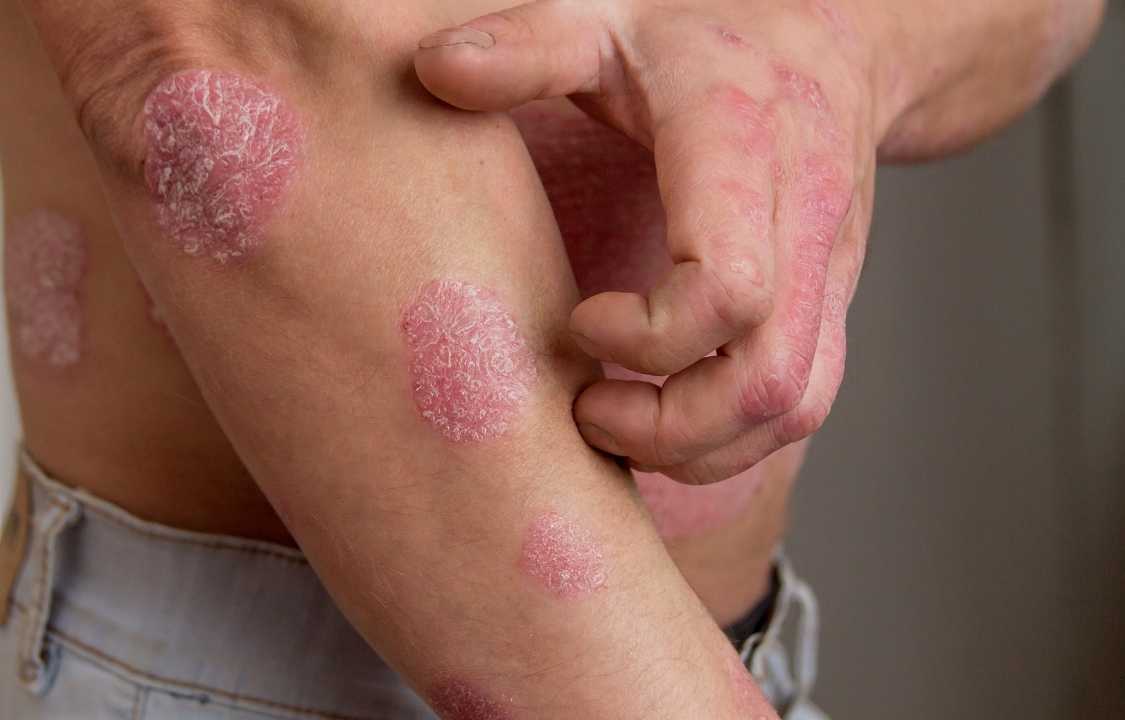While no cure exists, there are more and better options for clearing scaly plaques than ever before.
Being comfortable in your own skin takes on new meaning when it comes to living with plaque psoriasis, a chronic skin condition that has broader implications for one’s overall health and well-being. This article explores the multifaceted nature of plaque psoriasis, from its causes and diagnosis to treatment options and the psychosocial aspects of living with this condition.
Understanding Plaque Psoriasis
Plaque psoriasis is a skin condition characterized by raised plaques and scales that can be visually striking. On lighter skin tones, it often appears pink or silvery, while on darker skin, it may manifest as purple or yellowish patches. This condition is a result of inflammation triggered by immune system dysfunction, where the immune system reacts excessively to genetic or environmental triggers. This overreaction culminates in the development of inflamed, scaly patches known as plaque psoriasis.
Symptoms typically emerge between the ages of 15 and 25, although individuals of any age can develop this condition. While the precise causes of plaque psoriasis remain elusive, it is believed to be influenced by both genetic predisposition and environmental factors.
The Role of Genetics and Environment
The etiology of plaque psoriasis is likely a combination of nature and nurture. Genetics play a role, but the specifics remain a subject of ongoing research. Environmental triggers are also thought to contribute to the development of psoriasis. Some instances of plaque psoriasis can be explained by a phenomenon known as Koebnerization, where trauma or injury to the skin can lead to psoriasis development along the site of the injury. For example, surgical scars can sometimes be a site of psoriasis development.
Despite uncertainties about its precise triggers, scientists have a good understanding of what happens within the body when plaque psoriasis develops. Individuals with this condition possess an overactive immune system that accelerates the growth of skin cells. Unlike the normal skin cell turnover that occurs over a month, new cells in psoriasis patients emerge within three to four days. These rapidly produced cells accumulate on the skin’s surface, forming plaques and scales.
Diagnosing Plaque Psoriasis
Diagnosing plaque psoriasis primarily relies on clinical evaluation. Doctors examine the skin for characteristic signs of the condition, such as scaly and raised plaques, especially in common areas like the elbows, knees, and scalp. While biopsies are not typically necessary for diagnosis, they may be performed occasionally to rule out other skin conditions with similar symptoms.
Given that eczema can mimic psoriasis and vice versa, it is crucial to have a dermatologist make the definitive diagnosis. Dermatologists can discern subtle differences between the two conditions, ensuring accurate identification.
Treatment Options for Plaque Psoriasis
While there is no cure for plaque psoriasis, numerous treatment options can effectively manage and alleviate symptoms. The choice of treatment depends on various factors, including the severity of the condition. Available treatment modalities include:
1. Topical Creams and Ointments: These include steroid creams and other topical agents applied directly to the affected skin.
2. Systemic Treatments: Medications that target the immune system to slow down the inflammatory response.
3. Biologic Medications: Drugs that specifically target certain components of the immune system and are administered via injection or infusion.
4. Phototherapy: Exposure to controlled ultraviolet (UV) light to reduce inflammation and slow skin cell growth.
5. Alternative Therapies: Such as salt baths and aloe vera, which may provide relief in some cases.
The treatment landscape for psoriasis has evolved significantly, with a growing arsenal of options aimed at achieving higher levels of skin clearance.
Living with Plaque Psoriasis
Living with plaque psoriasis can be physically and emotionally challenging, as it not only affects the skin but also carries social implications. Over 7.5 million Americans, aged 20 and older, grapple with psoriasis, and one in three individuals with psoriasis may develop psoriatic arthritis, a condition characterized by joint swelling, stiffness, and pain.
Addressing Stigma
Stigma can be a significant issue for individuals with psoriasis. A study published in the Journal of the American Academy of Dermatology found that psoriasis is stigmatized to a degree similar to herpes. Misconceptions about psoriasis being infectious or contagious can contribute to this stigma.
Educating others about the condition can help dispel myths and foster understanding among friends, family, coworkers, and romantic partners. This proactive approach can help reduce the emotional burden associated with the condition.
Managing Stress
Stress management is critical for individuals grappling with plaque psoriasis, as heightened stress levels can act as a catalyst for flare-ups and intensify the discomfort of itching. The established link between stress and skin health reveals that stress has the capacity to impact the nerve cells within the skin, consequently influencing its overall condition.
In order to effectively alleviate stress, a range of strategies can be employed. These include meditation, engaging in exercise routines with the guidance and supervision of a healthcare professional, and seeking assistance from mental health experts. It is important to recognize that these interventions not only serve to mitigate stress but also contribute to one’s holistic well-being.
In summary, plaque psoriasis is a multifaceted skin condition that carries systemic implications extending beyond its outwardly visible symptoms. While the precise causes of this condition continue to be the subject of ongoing research, the evolution of treatment options offers a ray of hope for those who grapple with psoriasis. Achieving effective management necessitates the combination of medical treatments, stress reduction techniques, and the confrontation of social stigma, all of which together can significantly enhance the quality of life for individuals living with plaque psoriasis.

